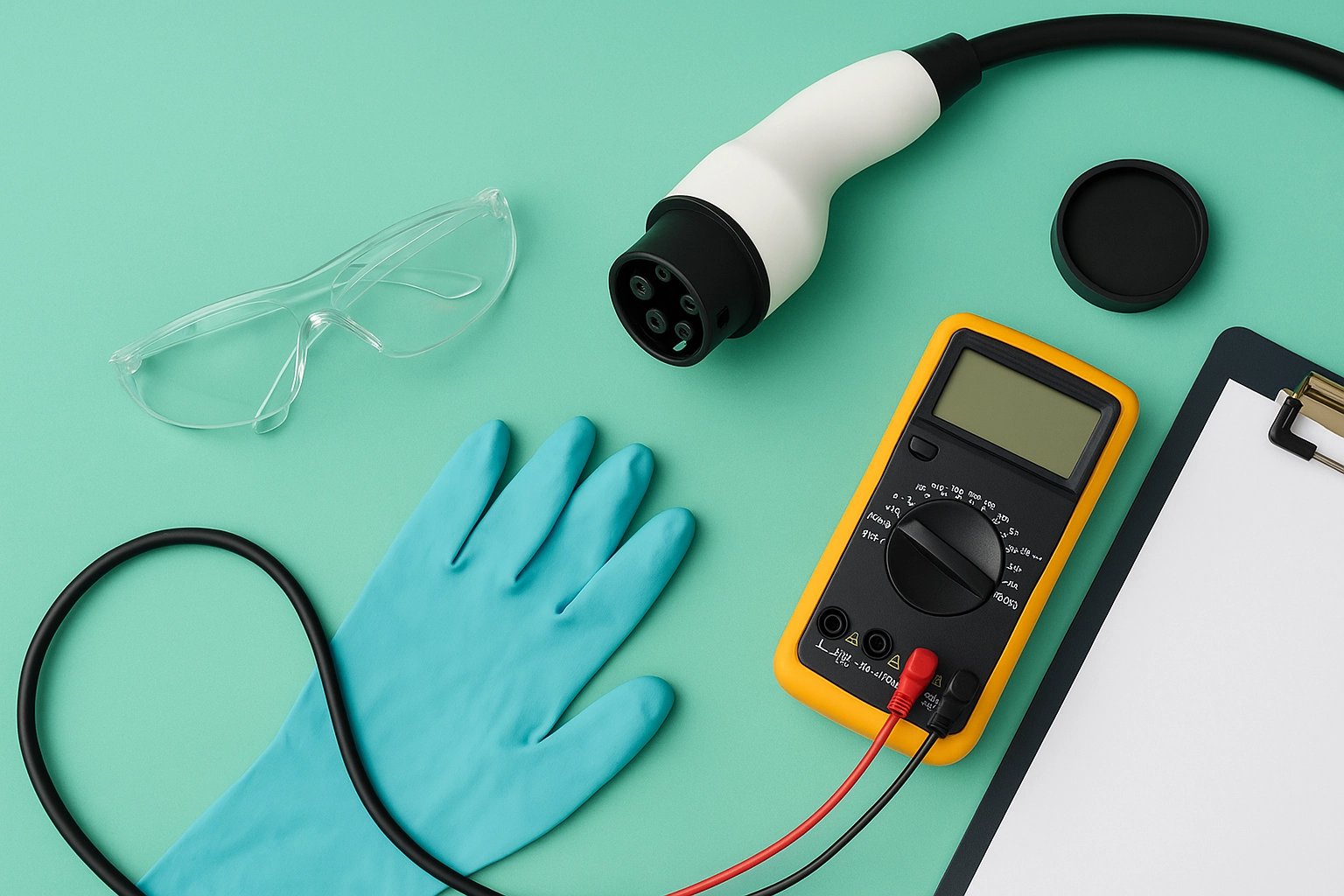IEC 63418 Bidirectional EV Charger Performance Test
The International Electrotechnical Commission (IEC) 63418 standard specifies the performance requirements for bidirectional charging systems used in electric vehicles. This test ensures that chargers operate efficiently, safely, and reliably under various conditions, which is critical as the automotive industry transitions towards electrification.
Bidirectional EV chargers are not only about charging; they also allow for power to flow both ways between the vehicle and the grid. This bi-directionality opens up possibilities for vehicle-to-grid (V2G) applications, where vehicles can act as mobile energy storage units that contribute to the smart grid. The IEC 63418 standard addresses these unique requirements by specifying performance criteria tailored to bidirectional chargers.
Compliance with this standard is mandatory for manufacturers aiming to ensure their products meet global regulatory standards and perform reliably in a variety of environments. This test evaluates key parameters such as charging efficiency, energy transfer accuracy, safety features, interoperability, and environmental robustness.
The IEC 63418 test includes both functional tests (ensuring the charger performs its intended function) and performance tests (evaluating how well it meets specified criteria). Functional tests include checks for correct connection, data exchange protocols, and error handling. Performance tests focus on charging efficiency, power quality, and durability under different operating conditions.
For manufacturers, passing this test is essential to ensure their products are ready for global markets. It provides a robust framework that helps avoid costly recalls or modifications post-market launch. Additionally, it ensures that vehicles can fully benefit from bi-directional capabilities such as V2G without compromising safety and performance.
The test methodology includes simulated real-world conditions that the charger must endure, ensuring it functions correctly under extreme temperatures, varying power sources, and diverse vehicle types. This comprehensive approach guarantees that bidirectional EV chargers are not only efficient but also safe and reliable in all operational scenarios.
Why It Matters
The automotive industry is undergoing a transformative shift towards electric vehicles (EVs), driven by environmental sustainability goals and government regulations. As part of this transition, the demand for efficient and safe EV charging infrastructure has grown exponentially.
- Bidirectional Charging Capabilities: IEC 63418 ensures that bidirectional chargers can not only charge vehicles but also contribute to the smart grid through V2G applications. This feature is crucial as it allows for energy optimization and peak-load management, enhancing both environmental sustainability and grid efficiency.
- Global Compliance: Compliance with this standard is mandatory in many regions, ensuring that chargers meet international safety and performance standards. This global compliance reduces market barriers and enhances the interoperability of EV charging infrastructure across different countries.
- User Safety and Reliability: The test ensures that bidirectional chargers are safe to use under all conditions, reducing the risk of electrical accidents or malfunctions. Reliable operation is essential for user trust and satisfaction in electric vehicle adoption.
The importance of IEC 63418 lies in its ability to bridge technology innovation with regulatory compliance and market acceptance. By ensuring that chargers meet these stringent standards, the industry can confidently deploy infrastructure that supports widespread EV use while maintaining high safety and performance levels.
Scope and Methodology
The IEC 63418 standard outlines comprehensive testing procedures for bidirectional EV chargers to ensure they meet specific performance requirements. The scope of the test includes both functional and performance aspects, ensuring that the charger operates reliably under various conditions.
- Functional Testing: This involves verifying that the charger can connect correctly, exchange data accurately, handle errors appropriately, and communicate with other devices seamlessly.
- Performance Testing: This evaluates the charger's efficiency, power quality, safety features, and durability. Specific parameters include charging speed, energy transfer accuracy, fault tolerance, and environmental robustness.
The test methodology includes simulating real-world conditions that the charger must endure. These simulations cover a wide range of scenarios such as varying ambient temperatures, different types of vehicles, and fluctuating power sources. This comprehensive approach ensures that the charger functions correctly in all operational environments.
For functional testing, the charger is subjected to various connection checks, data exchange protocols, and error handling routines. These tests are designed to ensure that the charger can operate safely and efficiently under normal conditions.
The performance testing involves evaluating key parameters such as charging efficiency, power quality, safety features, and durability. Charging efficiency is measured by comparing the input and output energy levels to ensure minimal losses during the charging process. Power quality checks ensure that the charger maintains stable voltage and current levels throughout operation. Safety features are tested for their effectiveness in preventing electrical accidents or malfunctions.
Durability tests assess how well the charger withstands prolonged use under various conditions. This includes evaluating the charger's performance over extended periods, exposure to extreme temperatures, and repeated charging cycles. These tests ensure that the charger remains reliable and safe even after extensive usage.
Why Choose This Test
- Compliance Assurance: Ensures compliance with international standards, opening up markets in regions where this standard is mandatory.
- Enhanced Safety: Verifies that the charger meets stringent safety requirements, reducing the risk of electrical accidents or malfunctions.
- Improved Efficiency: Evaluates the charger's efficiency and power quality to ensure minimal energy losses during operation.
- Durability and Reliability: Tests the charger's performance over extended periods, ensuring it remains reliable even after extensive use.
- User Satisfaction: Guarantees that users can trust the charger for safe and efficient EV charging experiences.
- Interoperability: Ensures compatibility with other devices and systems, enhancing the overall efficiency of the EV charging infrastructure.
The IEC 63418 test is a comprehensive evaluation that covers all aspects of bidirectional EV charger performance. By choosing this test, manufacturers can ensure their products meet global standards, enhance safety, improve efficiency, and increase user satisfaction. This not only supports the widespread adoption of electric vehicles but also contributes to environmental sustainability goals.





